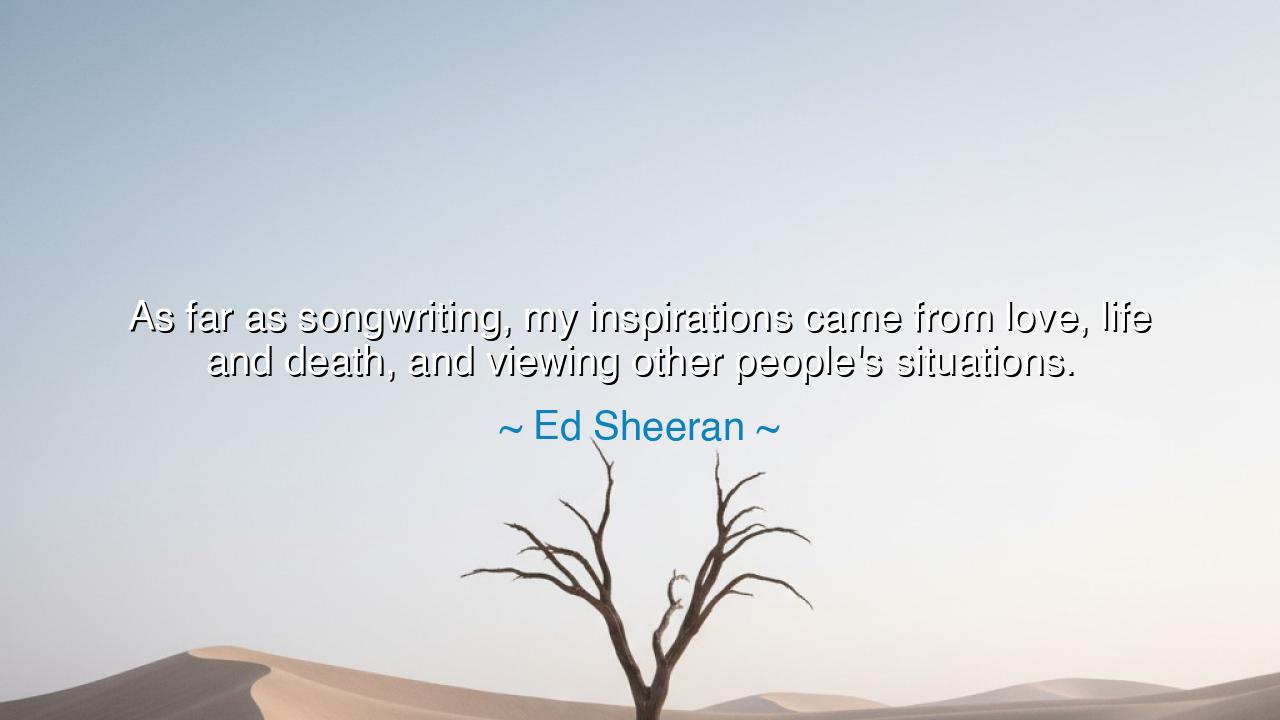
As far as songwriting, my inspirations came from love, life and
As far as songwriting, my inspirations came from love, life and death, and viewing other people's situations.






“As far as songwriting, my inspirations came from love, life and death, and viewing other people’s situations.” Thus spoke Ed Sheeran, a poet of our age clothed in melody, whose music has touched hearts across the world. Though born in modern times, his words echo the wisdom of the ancients — that art, in its truest form, is not an escape from life, but a reflection of it. In this simple confession, Sheeran reveals the trinity of creation — love, life, and death — the eternal themes that have stirred the hearts of artists, writers, and prophets since the dawn of humanity. His inspiration is not taken from fantasy, but from the raw and fragile beauty of existence itself, and from the quiet, often unseen stories of others.
The origin of this quote arises from Sheeran’s reflections on his craft as a songwriter — a craft rooted in empathy. Unlike those who chase fame or formula, Sheeran draws from the well of human experience. He writes of love, not as perfection, but as struggle, as longing, as redemption. He writes of life — with all its fleeting joys and growing pains — and of death, not as an end, but as a shadow that gives meaning to the light. And in viewing the situations of others, he becomes not merely a singer, but a witness to humanity. His songs, like ancient ballads, are vessels of remembrance, carrying the laughter and tears of countless souls.
To say that one’s inspiration comes from love, life, and death is to acknowledge the fullness of the human condition. Love — the fire that binds and breaks us. Life — the journey of becoming, filled with discovery and loss. Death — the silent teacher that reminds us of the value of every heartbeat. Together, they form the circle of existence, from which all art is born. The ancients knew this truth well. The poet Homer sang of love and war, of gods and men, weaving the threads of life and mortality into song. The playwright Sophocles showed that tragedy — even in its sorrow — can reveal the deepest truths of the soul. So too does Sheeran, in his time, follow this eternal path: transforming human experience into art that heals, connects, and endures.
To view other people’s situations, as Sheeran says, is an act of compassion — the artist stepping outside himself to see the world through another’s eyes. For art is not born in isolation; it grows in the soil of empathy. The great teacher Leo Tolstoy once said that “art is the transfer of emotion from one heart to another.” This is the same wisdom Sheeran lives by. When he writes of heartbreak, it is not only his heartbreak. When






AAdministratorAdministrator
Welcome, honored guests. Please leave a comment, we will respond soon